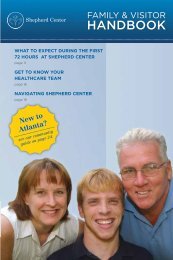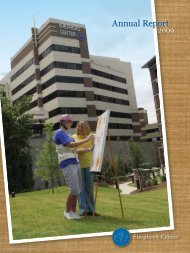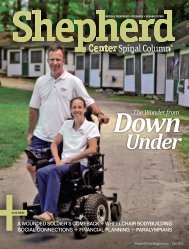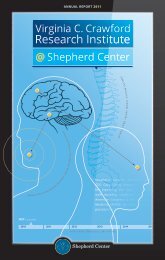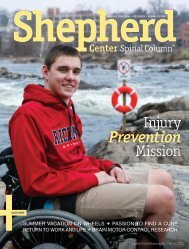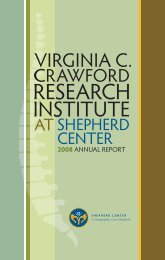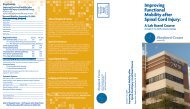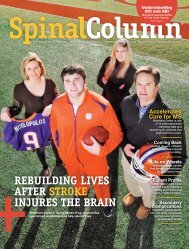INJURED - Shepherd Center
INJURED - Shepherd Center
INJURED - Shepherd Center
Create successful ePaper yourself
Turn your PDF publications into a flip-book with our unique Google optimized e-Paper software.
{<br />
{ Research<br />
Slowing<br />
the progression of<br />
Multiple<br />
Sclerosis<br />
<strong>Shepherd</strong> <strong>Center</strong> participates in clinical study of drug to<br />
treat debilitating form of MS. By Jane M. Sanders<br />
This spring, Joann Dickson wants to be able to walk in<br />
to her son’s middle school graduation ceremony without<br />
experiencing the extreme fatigue that plagues her because<br />
of secondary progressive multiple sclerosis.<br />
Joann, 49, of Newnan, Ga., is largely pinning her hopes on dirucotide<br />
(MBP8298), an experimental drug being studied in clinical trials at<br />
<strong>Shepherd</strong> <strong>Center</strong> and other sites. The drug may delay disease progression<br />
in people with secondary progressive multiple sclerosis (SPMS),<br />
an advanced and especially debilitating form of MS characterized by<br />
irreversible decline in both neurological and physical function. Joann<br />
was diagnosed with SPMS when she was pregnant with her now-14-<br />
year-old son Julian. Since then, the disease has progressed, now forcing<br />
Joann to primarily rely on a motorized scooter for mobility.<br />
“If the medicine will help with my mobility, along with the physical<br />
therapy I’m doing at <strong>Shepherd</strong> <strong>Center</strong>, that’s what I want – to be more<br />
mobile,” Joann explains. She also hopes the drug will address the balance<br />
problems and fatigue she experiences when walking. “It’s so tiring to<br />
walk. It takes the last little bit of energy I have,” she adds.<br />
Photo by Leita Cowart<br />
Joann shares similar expectations with eight other people participating<br />
in the MAESTRO-03 phase III clinical trial of dirucotide (MBP8298)<br />
at the Andrew C. Carlos Multiple Sclerosis Institute at <strong>Shepherd</strong> <strong>Center</strong>.<br />
The hospital is one of 68 sites participating in the two-year study. Since<br />
late summer 2008, the sites have been administering the drug intravenously<br />
every six months to about 510 patients nationwide.<br />
MAESTRO-03 is a double-blind, placebo-controlled study that is<br />
evaluating the efficacy and safety of dirucotide (MBP8298), which is<br />
licensed by BioMS Medical Corp. of Edmonton, Alberta, Canada. In a<br />
previous study, published in the European Journal of Neurology in<br />
August 2006, the drug showed a five-year delay in median time to<br />
disease progression in a subgroup of MS patients who have immune<br />
response genes HLA-DR2 and/or HLA-DR4. These genes are found in<br />
up to 75 percent of all MS patients.<br />
In early September 2008, the U.S. Food and Drug Administration<br />
(FDA) granted dirucotide (MBP8298) a fast-track designation, which is<br />
given to products that are intended to treat a serious or life-threatening<br />
condition and that demonstrate the potential to address unmet medical<br />
needs for that condition. Fast-track designation can potentially facilitate<br />
development and expedite the review process. There are few FDA-approved<br />
drugs to treat SPMS, which is the form of MS that afflicts 40 to<br />
45 percent of the 2.5 million people worldwide who have the disease.<br />
“Patients in the study at <strong>Shepherd</strong> <strong>Center</strong> are excited about this drug<br />
getting fast tracked,” says Carlyn Kappy, MAESTRO-03 research coordinator<br />
at <strong>Shepherd</strong> <strong>Center</strong>. “They say, ‘Maybe it will at least work for<br />
somebody else if it doesn’t work for me.’ They don’t have a lot of other<br />
options out there.”<br />
Dirucotide (MBP8298) appears to work by “teaching tolerance” to a<br />
patient’s immune system, so that the disease is not as aggressive in attacking<br />
and destroying patches of the protective myelin covering of the<br />
central nervous system, explains Dr. Ben Thrower, medical director of<br />
the MS Institute at <strong>Shepherd</strong> <strong>Center</strong> and the hospital’s lead investigator<br />
for MAESTRO-03.<br />
Researchers are evaluating the efficacy of dirucotide (MBP8298)<br />
with the Expanded Disability Status Scale (EDSS), which measures a<br />
patient’s mobility. Study participants also undergo tests of upper extremity<br />
agility and serial memory, as well as regular MRI exams. Using these<br />
tools, along with physical examinations, researchers evaluate whether<br />
study participants’ neurological symptoms are changed from one exam<br />
to the next one three months later.<br />
While Joann and other study participants eagerly await the results of<br />
the MAESTRO-03 clinical trial, a lot of other research on treatments<br />
for MS is under way, Dr. Thrower notes. One such drug, which also<br />
recently received a fast-track designation, is BG00012, an oral therapy<br />
licensed by Biogen Idec for treating relapsing-remitting MS. This drug<br />
is also being studied at <strong>Shepherd</strong> <strong>Center</strong> and 159 other sites. For more<br />
information, see www.clinicaltrials.gov.<br />
Left: Joann Dickson of Newnan, Ga., is participating in a <strong>Shepherd</strong><br />
<strong>Center</strong> clinical trial of dirucotide (MBP8298), an experimental drug<br />
being studied for its ability to delay disease progression in people<br />
with secondary progressive multiple sclerosis.<br />
14 Spinal column<br />
www.shepherd.org






